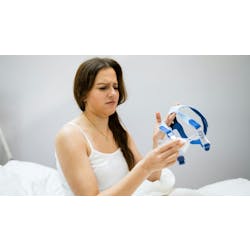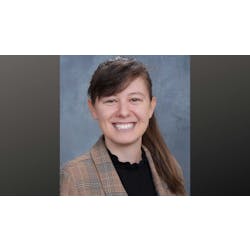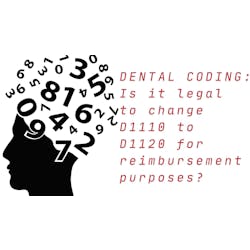By Ann-Marie DePalma, RDH, MEd, FADIA, FAADH
Dental practices have many patients who are either undergoing implant therapy or have implants placed and restored. Hygienists are the patient educators on a variety of topics. Implants are just one of the areas that patients turn to the hygiene team for education about appropriate home-care techniques to maintain their investment.
Michelle Strange, RDH, MSDH, has created a program called "Implant Health: Maintenance as the Cornerstone of Implant Health" that helps clinicians determine the appropriate products for their patients. Michelle's program:
- Reviews latest recommendations regarding interdental cleansing. It's not just about flossing anymore.
- Discusses embrasure spaces and why they're important in implant therapy.
- Identifies the types of prosthetic designs and prostheses for single-tooth replacement, implant-supported bridges, and dentures.
- Explains the latest options for patient home-care products for dental implants.
- Discusses creating hygiene access during the treatment-planning process.
- Reviews the ethics of patient education as related to dental implants.
Michelle believes that it is important to focus on patient-centered care and not the latest gimmicks. We need to understand and incorporate patient education throughout the implant process. Michelle feels that all team members will benefit from the program because patient education is very important to the overall success of an implant. It's time for dental professionals to be empowered to educate patients about this component of implant therapy. Michelle believes that we're obligated to inform patients how to maintain their oral health, especially regarding the investment of implants. She focuses on the research that allows clinicians to provide information about products that are essential to patient care.
Michelle typically does not provide handouts, but the program is presented in PowerPoint with a lot of interaction. This interaction promotes free exchange of ideas and information that drives the program forward, and thus creates a varied learning opportunity for each group to whom she presents. If the group is small enough, she will often provide models and use a more hands-on approach. Each presentation is geared to the needs of the group.
Michelle began her career in dentistry right out of high school. She had orthodontic treatment early in her life and ended up with orthognathic surgery. As a result, she suffers from condylar degeneration. Due to the challenges of the disease, she found that she loved researching and learning the science involved in dentistry. She loved dentistry so much that she decided to pursue dental hygiene. She is a graduate of Trident Technical College where she received her associate's degree in health science, and she received her BSDH from Medical University of South Carolina.
She practiced in a periodontal office where she received the support of the periodontist to provide the best products for patients. She also became a dental hygiene adjunct faculty member at Trident Technical. She enjoyed teaching so much that she pursued her MSDH from Fones School of Dental Hygiene in Connecticut. After receiving her master's degree, she worked part-time with TePe Oral Health Care as an educational consultant. She felt comfortable in that role since she had loved their products and felt that educating others about patient home care was an integral part of patient care. Many have asked her why she didn't go to dental school. Michelle tells them that she can do more as a hygienist to help educate patients than she could as a treating dentist.
She never imagined herself teaching or speaking in front of large groups, but found her passion for presenting continuing education when she presented her thesis research at the ADHA annual session in 2012. Her thesis centered on a topic near and dear to her-creating collaborative oral care for hospitalized patients. Michelle also cohosts a podcast for dental hygienists.
Michelle loves teaching and enjoys working with elderly patients. Combining the two would be a perfect world for her. She has limited experience with children and has worked mostly with geriatric patients, so she jokes that she would take the antics of a demented patient over the antics of a child any day. Michelle also feels strongly about inspiring high standards of patient care, infection control, and progressing the dental hygiene profession.
She has been an ADHA member since graduation and is concerned about the involvement of ADA in dental hygiene. Michelle is excited about the possibilities of the midlevel practitioner, and though she feels that dentistry lags far behind medicine in a number of areas, she is optimistic that there will soon be a day when hygienists will be able to treat those who have limited access to dental care.
If she were not a hygienist Michelle feels that she would be a veterinarian or veterinary tech since she loves animals. In fact, she would have a small zoo if she could! A friend recently described her as evangelistic, feisty, and a contradiction, a description Michelle feels captures her well.
Michelle enjoys seeing audiences inspired and excited to head back to their offices with renewed enthusiasm for patient care after one of her presentations. She is disappointed to see participants who don't engage in the program and don't want to learn anything new. Participants like this have often lost their love for the profession. If they were open to learning and trying new things, Michelle feels they would certainly regain some of that lost spirit.
Treating the underserved and elderly has impacted Michelle's heart the most. She has been on mission trips to Uganda and Nicaragua with the Palmetto Medical Initiative, and she's excited to be part of a group that is creating affordable, sustainable health care, and where dentistry is seen as an integral part of a person's medical care. Michelle doesn't believe she would have done anything differently with her career, although she said there were some practices where she worked too long, which made her a little crazy. However, without those experiences, she would not be where she is today.
Michelle encourages other hygienists who are feeling stuck to know that there are more than clinical positions available. She never saw herself taking the career paths that she has, but she feels that networking and educating herself about various topics have helped her immensely. Michelle wants all hygienists to treat CE courses not as something they have to do, but rather as something they want to do. Implementing the latest in patient education into your armamentarium for implant therapy can help move you and your practice to a higher level.
For more information about Michelle or her program, contact [email protected].
Thought for the month:
Develop a passion for learning. If you do, you will never cease to grow. -Anthony J. D'Angelo RDH
ANN-MARIE C. DEPALMA, RDH, MEd, FADIA, FAADH, is a Fellow of the American Academy of Dental Hygiene and the Association of Dental Implant Auxiliaries, as well as a continuous member of ADHA. She presents continuing education programs for dental team members on a variety of topics. Ann-Marie is collaborating with several authors on various books for dental hygiene and can be reached at [email protected].





